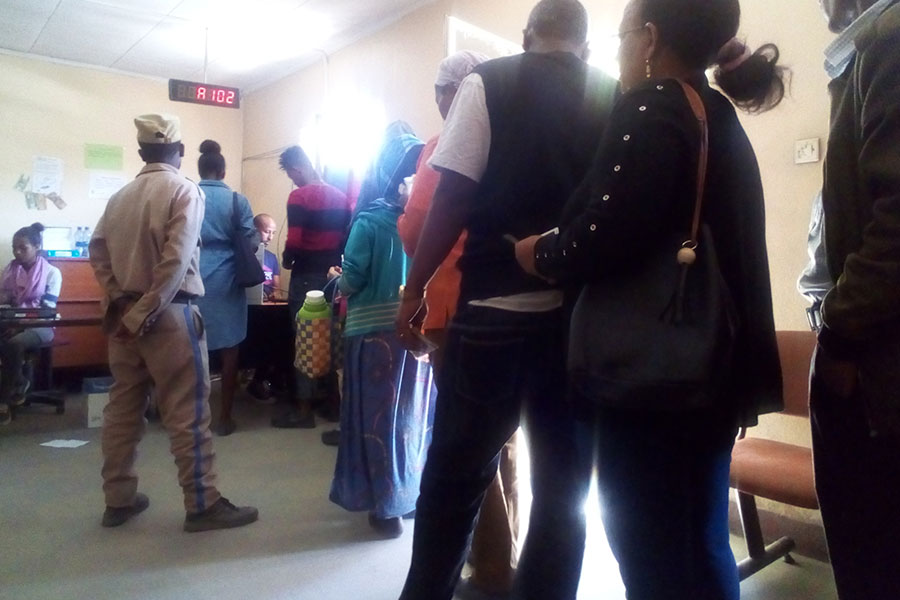
Radar | Aug 03,2025
Nov 16 , 2024
By
When the United Kingdom (UK) exited the European Union (EU), it introduced tariffs on imported goods, including flowers. While many countries were exempt due to existing trade deals, flowers from Kenya, Ethiopia, Tanzania, and Uganda, when bought through third countries like the Netherlands, were slapped with an eight percent tariff. A specific rule of origin agreed upon between the EU and the UK at the time of Brexit was to blame.
In April this year, the UK government suspended import duties on fresh flowers of non-EU origin, whether traded directly or through the EU. The suspension, set to last until June 2026 with a possible extension, was hailed as a boon for East African countries. The suspension was seen as a big win for major flower-growing regions in East Africa, and many in the industry were excited about the initiative.
The market anticipated that unlimited quantities of flowers would be exported to the UK with zero tariffs from Ethiopia, leading to heightened competition, improved resource allocation, boosted output, stimulated investment expansion, increased employment, and larger market share.
However, Ethiopia's optimism has not translated into tangible results. Exporters fail to seize the opportunity and unintentionally push it away.
According to data from the Ethiopian Customs Commission (ECC), before the suspension of the tariff, the total volume of cut flowers supplied to the UK market accounted for 7.8pc, estimated at 41.1 million dollars in value. No positive change has been recorded after introducing zero tariffs; the market share has significantly declined to six percent in September this year, and five percent in October 2024.
Very few flower-producing and exporting companies are motivated to optimise the benefits of the UK's zero-tariff initiative. Before the introduction of zero tariffs, the total number of flower-producing and exporting companies participating in the UK market ranged from four to six. Surprisingly, this number has reduced to two or three companies over the past four months.
Unlike Ethiopia, Kenya's floriculture sector has gained success following the temporary removal of the tariff by the UK. The floriculture sectors in Uganda and Tanzania also benefit immensely from this tariff suspension, enjoying greater market access and competitiveness in the UK.
Efforts have been made to explore the causal factors limiting Ethiopian growers. According to an exporter with a farm in the Bishoftu (Debre Zeit) cluster, Oromia Regional State, who used to supply flowers to the UK market for many years, the problem is not about overlooking the advantage of the tariff suspension but the long-term sales contract agreements made with UK retailers and supermarkets before the suspension.
Long-term contracts often lead to greater volatility and clearing prices that do not reflect actual supply and demand. Contracts reflect market conditions when signed, but conditions can change during the contract's duration. A long-term contract that was initially advantageous may become costly as time progresses. Such contracts can limit a company's ability to negotiate better pricing from buyers when situations change.
Another exporter operating in central Ethiopia, who supplied flowers to England for many years, found selling price negotiations in UK retail shops and supermarkets costly. He experienced that negotiations with buyers in different market segments are time-consuming and resource-intensive and may not always lead to a favourable outcome.
Several other flower farms operating in different horticulture clusters have a different take. They would argue that the suspension favoured 19 African countries that are members of the Commonwealth of Nations.
Most of these members are former British colonies that share common values, technical and development assistance schemes, preferential visa arrangements, market access possibilities, and direct contact with the British government. These include major flower-producing East African countries like Kenya, Uganda, and Tanzania. Since Ethiopia is not a member of this bloc, exporters consider this a factor that limits them from optimising the benefit of the UK's tariff suspension like their neighbouring East African countries.
Even before the tariff suspension, Kenyan growers had already saturated the UK flower market. One of the basic requirements to enter the UK's retail, wholesale, and supermarket sectors is Fair Trade Certification (FTC), which entails compliance from transparency, accountability and product traceability to sustainable business practices, safe working conditions, fair compensation, and environmental protection. More than 51pc of Kenyan flower farms are now Fair Trade certified, while in Ethiopia, not more than 12pc have such certifications.
Despite a high volume of flowers exported from Ethiopia to the UK market, strict Fair Trade Certification requirements are viewed as a barrier to using the tariff advantage in the UK.
There is also an argument that flowers from Ethiopia are re-exported to the UK by crossing the borders of importing countries. This enabled importing countries to reach UK markets that might be inaccessible for flower producers due to certification requirements or trade restrictions.
The implication is clear. While flowers from Ethiopia reach the UK market, the financial benefits from the tariff suspension are not realised by its exporters but by intermediaries in other countries. Importing countries eligible to enter the UK market benefit from its tariff suspension without a fair share of the benefits accruing to Ethiopia.
Unless these issues are addressed in time, Ethiopia's floriculture sector may continue to miss out on the opportunities presented by the UK's tariff suspension. Coordinated efforts among exporters, government agencies, and the industry are needed to renegotiate contracts, obtain necessary certifications, and explore new market access strategies. Without such initiatives, growers may continue to watch from the sidelines as their neighbours reap the benefits of expanded market access and increased competitiveness in the UK.
PUBLISHED ON
Nov 16,2024 [ VOL
25 , NO
1281]

Radar | Aug 03,2025

Agenda | Jan 12,2019

Commentaries | Jan 01,2022

Fortune News | Nov 07,2020

Fortune News | Oct 07,2023

Photo Gallery | 179564 Views | May 06,2019

Photo Gallery | 169761 Views | Apr 26,2019

Photo Gallery | 160691 Views | Oct 06,2021

My Opinion | 137190 Views | Aug 14,2021
Commentaries | Oct 25,2025

Dec 22 , 2024 . By TIZITA SHEWAFERAW
Charged with transforming colossal state-owned enterprises into modern and competitiv...

Aug 18 , 2024 . By AKSAH ITALO
Although predictable Yonas Zerihun's job in the ride-hailing service is not immune to...

Jul 28 , 2024 . By TIZITA SHEWAFERAW
Unhabitual, perhaps too many, Samuel Gebreyohannes, 38, used to occasionally enjoy a couple of beers at breakfast. However, he recently swit...

Jul 13 , 2024 . By AKSAH ITALO
Investors who rely on tractors, trucks, and field vehicles for commuting, transporting commodities, and f...

Oct 25 , 2025
The regulatory machinery is on overdrive. In only two years, no fewer than 35 new pro...

Oct 18 , 2025
The political establishment, notably the ruling party and its top brass, has become p...

Oct 11 , 2025
Ladislas Farago, a roving Associated Press (AP) correspondent, arrived in Ethiopia in...

Oct 4 , 2025
Eyob Tekalegn (PhD) had been in the Governor's chair for only weeks when, on Septembe...

Oct 25 , 2025 . By YITBAREK GETACHEW
Officials of the Addis Abeba's Education Bureau have embarked on an ambitious experim...

Oct 26 , 2025 . By YITBAREK GETACHEW
The federal government is making a landmark shift in its investment incentive regime...

Oct 29 , 2025 . By NAHOM AYELE
The National Bank of Ethiopia (NBE) is preparing to issue a directive that will funda...

Oct 26 , 2025 . By SURAFEL MULUGETA
A community of booksellers shadowing the Ethiopian National Theatre has been jolted b...